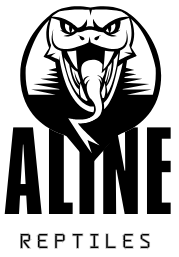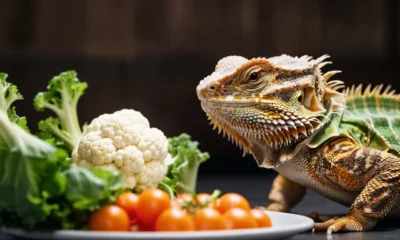As a responsible bearded dragon owner, ensuring your pet’s diet is both safe and nutritious is essential. You might be wondering, “Can bearded dragons eat cauliflower?” After all, it’s a common vegetable in many households.
Bearded dragons can eat cauliflower, but only in moderation. While cauliflower contains beneficial vitamins and minerals, it also has compounds that can interfere with calcium absorption, potentially harming your pet if fed too frequently.In this guide, we’ll break down the nutritional value, risks, benefits, safe feeding practices, and best alternatives to cauliflower for bearded dragons. Keep reading to ensure your dragon gets the best diet possible.
Nutritional Value of Cauliflower
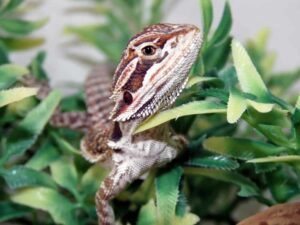
Before adding cauliflower to your bearded dragon’s diet, it’s important to understand its nutritional composition. Below is a breakdown of the key nutrients found in 100 grams of raw cauliflower:
| Nutrient | Amount | Benefit/Risk for Bearded Dragons |
|---|---|---|
| Water | 92.1 g | Hydrating, helps digestion |
| Protein | 1.9 g | Supports tissue repair |
| Fiber | 2 g | Aids in digestion |
| Calcium | 22 mg | Important but low in quantity |
| Phosphorus | 44 mg | High phosphorus ratio can be risky |
| Vitamin C | 48.2 mg | Supports immune system |
| Vitamin K | 15.5 mcg | Helps with blood clotting |
| Folate | 57 mcg | Aids in cell function |
| Oxalates | Moderate | May hinder calcium absorption |
| Goitrogens | Present | Can affect thyroid health |
Key Takeaways
- High in water and fiber, making it a hydrating food.
- Contains beneficial vitamins like Vitamin C and K.
- Low in calcium, high in phosphorus, which can be problematic for bone health.
- Has oxalates and goitrogens, which can interfere with calcium absorption and thyroid function if fed too often.
Risks of Feeding Cauliflower to Bearded Dragons
While cauliflower isn’t toxic, there are some risks associated with feeding it to bearded dragons regularly.
1. Goitrogens (Thyroid Interference)
Cauliflower contains goitrogens, compounds that can interfere with thyroid function by affecting iodine absorption. Over time, this could lead to thyroid imbalances.
2. High Phosphorus-to-Calcium Ratio
Bearded dragons require a high-calcium, low-phosphorus diet for strong bones. Cauliflower has more phosphorus than calcium, which can contribute to Metabolic Bone Disease (MBD) if fed too frequently.
| Nutrient | Ideal Ratio for Bearded Dragons | Cauliflower’s Ratio |
| Calcium | Higher than phosphorus | 1:2 (Not ideal) |
| Phosphorus | Lower than calcium | More than calcium |
3. Digestive Issues
Too much cauliflower can cause gas, bloating, or diarrhea due to its fiber content. Bearded dragons have delicate digestive systems, and excessive fiber intake may lead to discomfort.
How Often Can Bearded Dragons Eat Cauliflower?
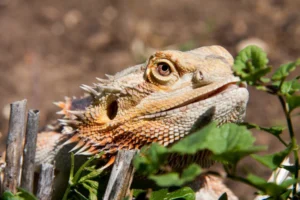
To minimize risks while still offering variety, bearded dragons should eat cauliflower sparingly—around once or twice per month in small portions.
Safe Feeding Guidelines:
- Portion Size: A small floret (about the size of a bearded dragon’s eye)
- Frequency: Once or twice a month
- Preparation: Wash thoroughly, chop into small pieces, and serve raw or lightly steamed
- Mix With: High-calcium greens like collard greens or dandelion greens
Pro Tip: Avoid feeding cauliflower alongside other goitrogenic vegetables like kale, cabbage, or broccoli in the same meal.
Best Alternatives to Cauliflower for a Balanced Diet
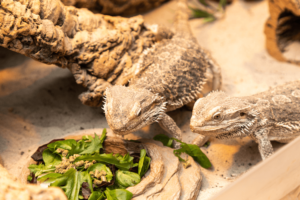
Since cauliflower isn’t the best daily option, here are healthier alternatives that are nutrient-rich and safe for regular feeding:
Best Staple Greens (Can Be Fed Daily)
| Vegetable | Calcium (mg per 100g) | Phosphorus (mg per 100g) | Benefits |
| Collard Greens | 232 | 25 | High in calcium, great for bone health |
| Mustard Greens | 115 | 41 | Rich in vitamins A, C, and K |
| Dandelion Greens | 187 | 66 | Good calcium-to-phosphorus ratio |
Best Occasional Veggies (2-3 Times per Week)
| Vegetable | Benefits |
| Bell Peppers | High in Vitamin C, promotes eye health |
| Butternut Squash | Rich in Vitamin A, supports immune function |
| Zucchini | Low in oxalates, hydrating |
Vegetables to Avoid (Toxic or Unsafe)
| Vegetable | Why Avoid? |
| Avocado | Toxic, can cause serious illness |
| Rhubarb | Contains oxalates that can be fatal |
| Iceberg Lettuce | Nutrient-poor, can cause diarrhea |
FAQs About Bearded Dragons and Cauliflower
1. Can Bearded Dragons Eat Cauliflower Leaves and Stems?
Yes, but in moderation. The leaves and stems also contain goitrogens, so they should be offered sparingly.
2. Can Baby Bearded Dragons Eat Cauliflower?
It’s best to avoid feeding cauliflower to baby bearded dragons. They need a calcium-rich diet for proper growth, and cauliflower’s phosphorus content can be harmful.
3. What Happens if a Bearded Dragon Eats Too Much Cauliflower?
Overfeeding cauliflower can lead to digestive upset, bloating, and long-term calcium deficiency issues. If your dragon shows signs of distress after eating cauliflower, monitor them closely and provide calcium-rich foods to balance their diet.
Conclusion
Cauliflower is not toxic to bearded dragons, but it should be fed sparingly due to its phosphorus content and goitrogens. As a general rule: Yes, they can eat cauliflower – but only as an occasional treat. No, it should not be a regular part of their diet.
